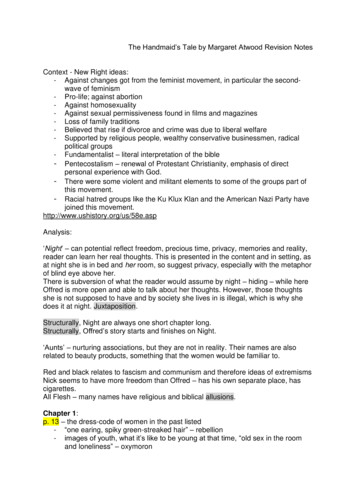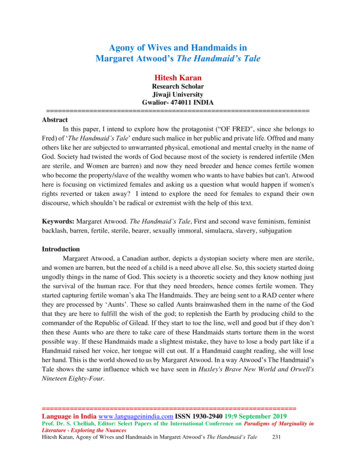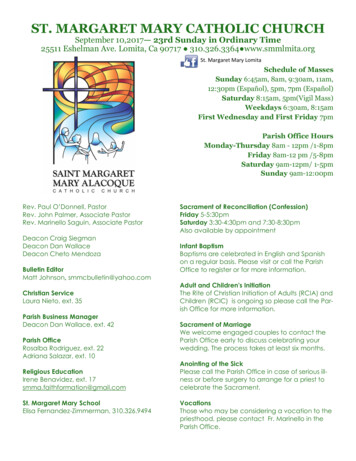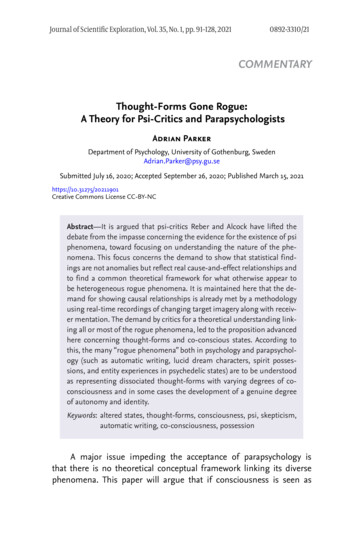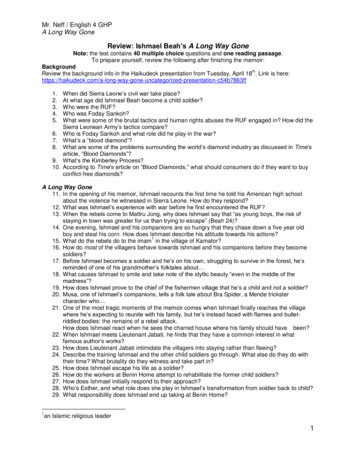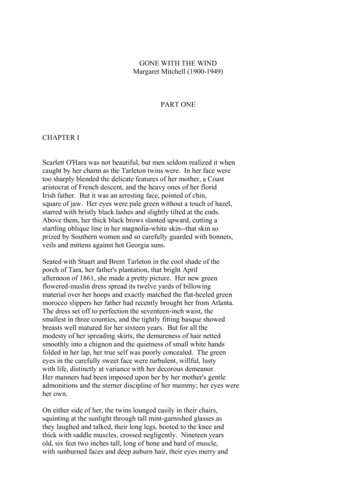
Transcription
GONE WITH THE WINDMargaret Mitchell (1900-1949)PART ONECHAPTER IScarlett O'Hara was not beautiful, but men seldom realized it whencaught by her charm as the Tarleton twins were. In her face weretoo sharply blended the delicate features of her mother, a Coastaristocrat of French descent, and the heavy ones of her floridIrish father. But it was an arresting face, pointed of chin,square of jaw. Her eyes were pale green without a touch of hazel,starred with bristly black lashes and slightly tilted at the ends.Above them, her thick black brows slanted upward, cutting astartling oblique line in her magnolia-white skin--that skin soprized by Southern women and so carefully guarded with bonnets,veils and mittens against hot Georgia suns.Seated with Stuart and Brent Tarleton in the cool shade of theporch of Tara, her father's plantation, that bright Aprilafternoon of 1861, she made a pretty picture. Her new greenflowered-muslin dress spread its twelve yards of billowingmaterial over her hoops and exactly matched the flat-heeled greenmorocco slippers her father had recently brought her from Atlanta.The dress set off to perfection the seventeen-inch waist, thesmallest in three counties, and the tightly fitting basque showedbreasts well matured for her sixteen years. But for all themodesty of her spreading skirts, the demureness of hair nettedsmoothly into a chignon and the quietness of small white handsfolded in her lap, her true self was poorly concealed. The greeneyes in the carefully sweet face were turbulent, willful, lustywith life, distinctly at variance with her decorous demeanor.Her manners had been imposed upon her by her mother's gentleadmonitions and the sterner discipline of her mammy; her eyes wereher own.On either side of her, the twins lounged easily in their chairs,squinting at the sunlight through tall mint-garnished glasses asthey laughed and talked, their long legs, booted to the knee andthick with saddle muscles, crossed negligently. Nineteen yearsold, six feet two inches tall, long of bone and hard of muscle,with sunburned faces and deep auburn hair, their eyes merry and
arrogant, their bodies clothed in identical blue coats andmustard-colored breeches, they were as much alike as two bolls ofcotton.Outside, the late afternoon sun slanted down in the yard, throwinginto gleaming brightness the dogwood trees that were solid massesof white blossoms against the background of new green. The twins'horses were hitched in the driveway, big animals, red as theirmasters' hair; and around the horses' legs quarreled the pack oflean, nervous possum hounds that accompanied Stuart and Brentwherever they went. A little aloof, as became an aristocrat, laya black-spotted carriage dog, muzzle on paws, patiently waitingfor the boys to go home to supper.Between the hounds and the horses and the twins there was akinship deeper than that of their constant companionship. Theywere all healthy, thoughtless young animals, sleek, graceful,high-spirited, the boys as mettlesome as the horses they rode,mettlesome and dangerous but, withal, sweet-tempered to those whoknew how to handle them.Although born to the ease of plantation life, waited on hand andfoot since infancy, the faces of the three on the porch wereneither slack nor soft. They had the vigor and alertness ofcountry people who have spent all their lives in the open andtroubled their heads very little with dull things in books. Lifein the north Georgia county of Clayton was still new and,according to the standards of Augusta, Savannah and Charleston, alittle crude. The more sedate and older sections of the Southlooked down their noses at the up-country Georgians, but here innorth Georgia, a lack of the niceties of classical educationcarried no shame, provided a man was smart in the things thatmattered. And raising good cotton, riding well, shootingstraight, dancing lightly, squiring the ladies with elegance andcarrying one's liquor like a gentleman were the things thatmattered.In these accomplishments the twins excelled, and they were equallyoutstanding in their notorious inability to learn anythingcontained between the covers of books. Their family had moremoney, more horses, more slaves than any one else in the County,but the boys had less grammar than most of their poor Crackerneighbors.It was for this precise reason that Stuart and Brent were idlingon the porch of Tara this April afternoon. They had just beenexpelled from the University of Georgia, the fourth universitythat had thrown them out in two years; and their older brothers,Tom and Boyd, had come home with them, because they refused toremain at an institution where the twins were not welcome. Stuart
and Brent considered their latest expulsion a fine joke, andScarlett, who had not willingly opened a book since leaving theFayetteville Female Academy the year before, thought it just asamusing as they did."I know you two don't care about being expelled, or Tom either,"she said. "But what about Boyd? He's kind of set on getting aneducation, and you two have pulled him out of the University ofVirginia and Alabama and South Carolina and now Georgia. He'llnever get finished at this rate.""Oh, he can read law in Judge Parmalee's office over inFayetteville," answered Brent carelessly. "Besides, it don'tmatter much. We'd have had to come home before the term was outanyway.""Why?""The war, goose! The war's going to start any day, and you don'tsuppose any of us would stay in college with a war going on, doyou?""You know there isn't going to be any war," said Scarlett, bored."It's all just talk. Why, Ashley Wilkes and his father told Pajust last week that our commissioners in Washington would cometo--to--an--amicable agreement with Mr. Lincoln about theConfederacy. And anyway, the Yankees are too scared of us tofight. There won't be any war, and I'm tired of hearing aboutit.""Not going to be any war!" cried the twins indignantly, as thoughthey had been defrauded."Why, honey, of course there's going to be a war," said Stuart."The Yankees may be scared of us, but after the way GeneralBeauregard shelled them out of Fort Sumter day before yesterday,they'll have to fight or stand branded as cowards before the wholeworld. Why, the Confederacy--"Scarlett made a mouth of bored impatience."If you say 'war' just once more, I'll go in the house and shutthe door. I've never gotten so tired of any one word in my lifeas 'war,' unless it's 'secession.' Pa talks war morning, noon andnight, and all the gentlemen who come to see him shout about FortSumter and States' Rights and Abe Lincoln till I get so bored Icould scream! And that's all the boys talk about, too, that andtheir old Troop. There hasn't been any fun at any party thisspring because the boys can't talk about anything else. I'mmighty glad Georgia waited till after Christmas before it seceded
or it would have ruined the Christmas parties, too. If you say'war' again, I'll go in the house."She meant what she said, for she could never long endure anyconversation of which she was not the chief subject. But shesmiled when she spoke, consciously deepening her dimple andfluttering her bristly black lashes as swiftly as butterflies'wings. The boys were enchanted, as she had intended them to be,and they hastened to apologize for boring her. They thought nonethe less of her for her lack of interest. Indeed, they thoughtmore. War was men's business, not ladies', and they took herattitude as evidence of her femininity.Having maneuvered them away from the boring subject of war, shewent back with interest to their immediate situation."What did your mother say about you two being expelled again?"The boys looked uncomfortable, recalling their mother's conductthree months ago when they had come home, by request, from theUniversity of Virginia."Well," said Stuart, "she hasn't had a chance to say anything yet.Tom and us left home early this morning before she got up, andTom's laying out over at the Fontaines' while we came over here.""Didn't she say anything when you got home last night?""We were in luck last night. Just before we got home that newstallion Ma got in Kentucky last month was brought in, and theplace was in a stew. The big brute--he's a grand horse, Scarlett;you must tell your pa to come over and see him right away--he'dalready bitten a hunk out of his groom on the way down here andhe'd trampled two of Ma's darkies who met the train at Jonesboro.And just before we got home, he'd about kicked the stable down andhalf-killed Strawberry, Ma's old stallion. When we got home, Mawas out in the stable with a sackful of sugar smoothing him downand doing it mighty well, too. The darkies were hanging from therafters, popeyed, they were so scared, but Ma was talking to thehorse like he was folks and he was eating out of her hand. Thereain't nobody like Ma with a horse. And when she saw us she said:'In Heaven's name, what are you four doing home again? You'reworse than the plagues of Egypt!' And then the horse begansnorting and rearing and she said: 'Get out of here! Can't yousee he's nervous, the big darling? I'll tend to you four in themorning!' So we went to bed, and this morning we got away beforeshe could catch us and left Boyd to handle her.""Do you suppose she'll hit Boyd?" Scarlett, like the rest of theCounty, could never get used to the way small Mrs. Tarleton
bullied her grown sons and laid her riding crop on their backs ifthe occasion seemed to warrant it.Beatrice Tarleton was a busy woman, having on her hands not only alarge cotton plantation, a hundred negroes and eight children, butthe largest horse-breeding farm in the state as well. She washot-tempered and easily plagued by the frequent scrapes of herfour sons, and while no one was permitted to whip a horse or aslave, she felt that a lick now and then didn't do the boys anyharm."Of course she won't hit Boyd. She never did beat Boyd muchbecause he's the oldest and besides he's the runt of the litter,"said Stuart, proud of his six feet two. "That's why we left himat home to explain things to her. God'lmighty, Ma ought to stoplicking us! We're nineteen and Tom's twenty-one, and she actslike we're six years old.""Will your mother ride the new horse to the Wilkes barbecuetomorrow?""She wants to, but Pa says he's too dangerous. And, anyway, thegirls won't let her. They said they were going to have her go toone party at least like a lady, riding in the carriage.""I hope it doesn't rain tomorrow," said Scarlett. "It's rainednearly every day for a week. There's nothing worse than abarbecue turned into an indoor picnic.""Oh, it'll be clear tomorrow and hot as June," said Stuart."Look at that sunset. I never saw one redder. You can alwaystell weather by sunsets."They looked out across the endless acres of Gerald O'Hara's newlyplowed cotton fields toward the red horizon. Now that the sun wassetting in a welter of crimson behind the hills across the FlintRiver, the warmth of the April day was ebbing into a faint butbalmy chill.Spring had come early that year, with warm quick rains and suddenfrothing of pink peach blossoms and dogwood dappling with whitestars the dark river swamp and far-off hills. Already the plowingwas nearly finished, and the bloody glory of the sunset coloredthe fresh-cut furrows of red Georgia clay to even redder hues.The moist hungry earth, waiting upturned for the cotton seeds,showed pinkish on the sandy tops of furrows, vermilion and scarletand maroon where shadows lay along the sides of the trenches. Thewhitewashed brick plantation house seemed an island set in a wildred sea, a sea of spiraling, curving, crescent billows petrifiedsuddenly at the moment when the pink-tipped waves were breaking
into surf. For here were no long, straight furrows, such as couldbe seen in the yellow clay fields of the flat middle Georgiacountry or in the lush black earth of the coastal plantations.The rolling foothill country of north Georgia was plowed in amillion curves to keep the rich earth from washing down into theriver bottoms.It was a savagely red land, blood-colored after rains, brick dustin droughts, the best cotton land in the world. It was a pleasantland of white houses, peaceful plowed fields and sluggish yellowrivers, but a land of contrasts, of brightest sun glare anddensest shade. The plantation clearings and miles of cottonfields smiled up to a warm sun, placid, complacent. At theiredges rose the virgin forests, dark and cool even in the hottestnoons, mysterious, a little sinister, the soughing pines seemingto wait with an age-old patience, to threaten with soft sighs:"Be careful! Be careful! We had you once. We can take you backagain."To the ears of the three on the porch came the sounds of hooves,the jingling of harness chains and the shrill careless laughterof negro voices, as the field hands and mules came in from thefields. From within the house floated the soft voice ofScarlett's mother, Ellen O'Hara, as she called to the little blackgirl who carried her basket of keys. The high-pitched, childishvoice answered "Yas'm," and there were sounds of footsteps goingout the back way toward the smokehouse where Ellen would rationout the food to the home-coming hands. There was the click ofchina and the rattle of silver as Pork, the valet-butler of Tara,laid the table for supper.At these last sounds, the twins realized it was time they werestarting home. But they were loath to face their mother and theylingered on the porch of Tara, momentarily expecting Scarlett togive them an invitation to supper."Look, Scarlett. About tomorrow," said Brent. "Just becausewe've been away and didn't know about the barbecue and the ball,that's no reason why we shouldn't get plenty of dances tomorrownight. You haven't promised them all, have you?""Well, I have! How did I know you all would be home? I couldn'trisk being a wallflower just waiting on you two.""You a wallflower!" The boys laughed uproariously."Look, honey. You've got to give me the
Scarlett, who had not willingly opened a book since leaving the Fayetteville Female Academy the year before, thought it just as amusing as they did. "I know you two don't care about being expelled, or Tom either," she said. "But what about Boyd? He's kind of set on getting an education, and you two have pulled him out of the University of Virginia and Alabama and South Carolina and now Georgia .
